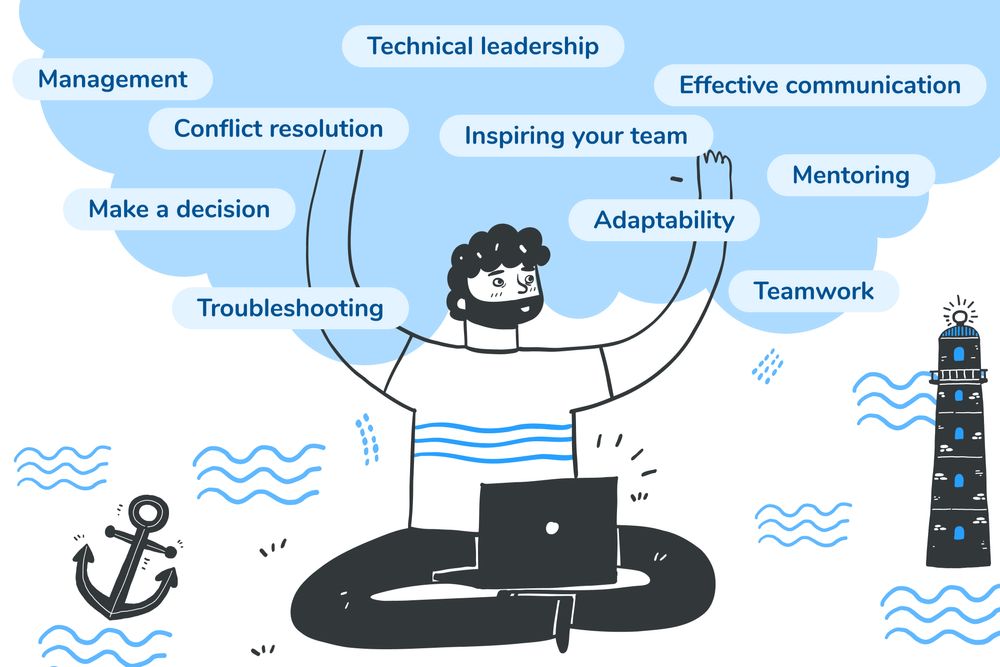Not every manager excels in software development. And while technical leadership is undoubtedly crucial, to truly excel as a technical leader, you also have to possess effective "human" skills to get the job done. Developer leadership is not about bossing others around, but rather about guiding and inspiring your software development teams to achieve their best.
In this blog post, we'll offer some insights and explore the essential skills required for a software engineer. We'll also delve into what these skills are, and discuss why they are indispensable in software development. Furthermore, we will provide practical tips on how to improve in this fast-paced tech industry.
What Skills Do You Need for Developer Leadership as a Software Engineer?
Being a successful software engineer entails much more than coding proficiency. To thrive in this field, you should possess a combination of technical and soft skills:
- Technical Skills:
- Programming Languages: Mastery of relevant programming languages, architecture, frameworks, and tools is fundamental.
- Problem-Solving: The ability to dissect complex problems, develop solutions, and write great algorithms.
- Debugging: Skill in identifying and fixing bugs, which is crucial for maintaining software.
- Version Control: Knowledge of systems like Git for code collaboration and management.
- Agile Methodologies: Understanding and application of Agile principles for efficient project development.
- Efficiency: Efficiently managing tasks and deadlines is crucial.
- Soft Skills:
- Communication Skills: Forget metrics! Focus on people skills with effective communication as it helps get your message across to team members, stakeholders, and clients. This is the most important non-technical skill you'll need to communicate with your software teams and team leads.
- Collaboration: The ability to work well within a team and leverage each team member's strengths.
- Adaptability: Given the rapidly changing technology landscape, adaptability is key.
- Attention to Detail: Precision and thorough testing to ensure quality.
- Management Skills: Efficiently leading developers, and engineering teams, and managing tasks and deadlines are crucial.
- Continuous Learning: Keeping up with industry trends and new technologies.
What Are Leadership Skills, and Why Are They Important in Software Development?
Leadership skills refer to a set of qualities and abilities that enable individuals to guide, motivate, and influence others toward achieving common goals. In software development, these skills are vital for several reasons:
- Team Productivity: Effective leaders can inspire their teams to work cohesively, enhancing overall efficiency.
- Problem Solving: Leaders often encounter complex issues that require innovative solutions. When you're an ace at problem-solving, you can tackle these challenges head-on.
- Decision-Making: This skill helps engineering leadership make informed decisions that align with project objectives.
- Communication Skills: Clear communication is critical to avoid setbacks, and for conveying ideas, requirements, and project updates to team members and stakeholders.
- Conflict Resolution: Disagreements are common in development teams. Management skills help in resolving conflicts and maintaining a positive work environment.
- Mentorship: Leaders mentor and nurture junior engineers, fostering their growth and development.
- Stakeholder Management: Effective management is essential when dealing with clients, ensuring their needs are met and their expectations managed.
- Adaptability: Leaders must navigate the ever-evolving tech landscape and changing project requirements.
Practical Tips to Improve Developer Leadership
Let's explore some practical tips to enhance your abilities:
- Lead by Example: To become a better leader, you have to demonstrate the work ethic, professionalism, and attitude you expect from your team.
- Active Listening: Pay close attention to your team's concerns and ideas, fostering a culture of open communication.
- Empower Your Team: Delegate responsibilities and trust your team members to make decisions within their areas of expertise.
- Set Clear Goals: Establish well-defined project goals and communicate them clearly to your team.
- Provide Feedback: Offer constructive feedback and recognize your team's achievements to boost morale.
- Learn Continuously: Stay up-to-date with industry trends and engineering best practices.
- Foster a Collaborative Environment: Encourage knowledge sharing and collaboration among team members.
- Problem-Solving Skills: Hone your strategic abilities to analyze and solve complex technical issues.
- Emotional Intelligence: Develop self-awareness and empathy to better understand and connect with your team.
- Seek Mentorship: Learn from experienced leaders in your field and seek guidance when needed.
Conclusion
As a software developer, technical skills are your foundation, but showing your human side when managing dilemmas in the development process is your ticket to becoming a standout professional in the industry. By combining your technical expertise with effective managerial qualities, you can lead teams, drive projects to success, and contribute significantly to your own personal development and that of the software development community. Keep learning, practicing, and evolving as a developer to make a lasting impact in this ever-evolving field.





